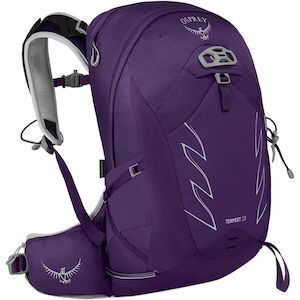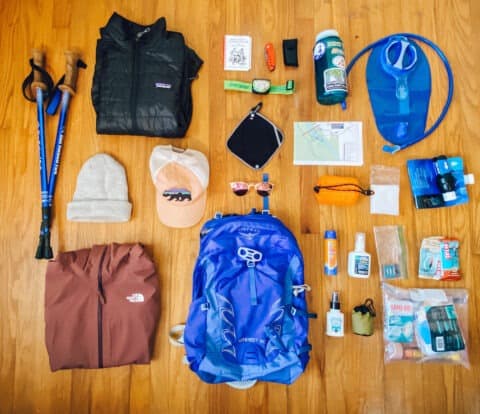
The perfect daypack, or hiking backpack, is one of the most important pieces of gear a hiker owns. But with literally hundreds of daypacks and backpacks to pick from, how do you choose? Shopping for the best daypacks for women can be totally confusing, especially for a beginner hiker.
When I first started out, I probably spent hours wandering through REI with absolutely no idea what I needed in a daypack. Frames? Frameless? Hydration reservoirs? Hip belts? What the heck?
And not to mention the obvious, but us girls are usually shaped a little differently than men. For some, a one-size-fits-all pack (which usually means built for a man) just won’t do the trick!
After a lot of trial and error, I’ve dialed in on what hiking daypacks work for short walks, strenuous hikes, and everything in between. So, whether you’re looking to invest in your very first hiking backpack or looking to upgrade your gear – keep reading for my complete guide to finding the best daypacks for women.
Table of Contents
Quick Picks: Top Picks for the Best Hiking Daypacks for Women
Best All Around Daypack for Women: Osprey Women’s Tempest 20L
Best Budget Hiking Daypack: REI Flash Pack 22L
Best Travel-Friendly Daypack: REI Flash Pack 22L
This post contains some affiliate links, which means if you buy something, my blog will receive a small commission at no extra cost to you. I will never recommend products or links on this blog that I have not personally used or fully endorse.
Choosing the Best Hiking Daypacks: The Basics
What is a Daypack?
How is a daypack different than a regular backpack? Many people use the terms “daypack” “backpack” and “pack” interchangeably. Put simply, a daypack is a kind of backpack. The term “daypack” generally refers to a backpack that is built specifically for day hiking.
Women’s Daypacks vs Men’s Daypacks – What’s the Difference?
When it comes to buying the perfect hiking daypack, proper fit is key. Unfortunately, most unisex bags are still designed with men’s specifications in mind (*cue eye roll 🙄).
Hiking daypacks advertised “for women” are designed to better fit the dimensions of women’s bodies. Hiking daypacks for women generally accommodate a wider hip and chest area. Backpack straps are usually a bit more curved with a higher chest strap. If the pack has a frame, the frame is usually shorter to fit a smaller torso.

Overall, many women find the sizing and comfort of a women’s-specific hiking backpack to be a better fit. However, choosing a hiking daypack is all about what works for YOU. All of the packs listed here also come in men’s or uni-sex sizes. Don’t be afraid to try on as many styles as it takes to find the one that makes sense for your body.
I’m using the term “women” here, but I also want to include any gender non-conforming individuals, transgender men and women, and those assigned female at birth who would benefit from a “women’s” size pack.
Daypacks vs Backpacking Packs
Day hiking generally refers to hikes where you don’t plan on spending the night outside. Backpacking, on the other hand, is a multi-day hike and backpackers must be able to carry all their food, clothing, and camping supplies in their pack.
The difference between most daypacks and backpacking packs comes down to size and support. More time on the trail means more gear to carry, which means a bigger pack is necessary.
Backpacking packs normally range from 40L to over 70L, while daypacks are generally 10L to 30L.
While this guide focuses exclusively on the best daypacks for women, check out this REI guide to backpacking packs if you’re planning a multi-day trek.
My Choices for the Best Daypacks for Women
Best All Around Daypack for Women: Osprey Women’s Tempest 20L
The Osprey Tempest 20L is my go-to daypack for almost all hikes. This pack is the perfect combination of features and comfort, making it one of the most widely used and best daypacks for women.
Pros: The internal plastic back panel provides enough structure and support to keep my granny-back from aching on long hikes. The padded hip belt pockets sit comfortably and are perfect for storing snacks, hand sanitizer and other small items. The Tempest has a hydration reservoir pocket and two side mesh pockets for water-bottles. This pack also has attachments to store your trekking poles, ice axe, and helmet.
The Tempest comes in two sizes: XS/S or M/L (depending on your torso length and hip width) and both sizes have an adjustable torso length for the perfect fit.
Cons: The two biggest cons for this pack are (1) price (ordinary retail price is $130) and (2) there is no built in rain cover. Rain covers can be purchased separately.
Runner Up Best All Around Daypack for Women: Deuter Speed Lite 22 Women’s Pack
Pros: The Deuter Speed Lite is another popular women’s daypack option. The pack is 2L larger than the Tempest, and retails for a slightly lower price (usually, $115). Most importantly, the Deuter Speed Lite is one of the lightest internal frame daypacks available, weighing 1 lbs. 9 oz.
Cons: To keep it light, this pack has fewer bells and whistles than the Tempest 20L. It is also available in only one size and does not have an adjustable torso length.
Best Women’s Hiking Backpack with Extra Support: Osprey Women’s Sirrus 24L
The Osprey Sirrus is my pack of choice for long and strenuous hikes that require more gear weight.
Pros: The alloy rod frame is relatively light while providing excellent support for heavier loads. Like the Tempest 20, the Sirrus 24 has padded hip belt pockets, a hydration reservoir pocket, and trekking pole and ice axe attachments. My favorite features are the built in rain cover, and
Cons: At 2 lbs 9 oz, the Osprey Sirrus pack is certainly not lightweight. The Sirrus also only comes in one size, but does have an adjustable torso length.
Best Budget Hiking Daypack: REI Flash 22 / Flash 18 Daypack
When it comes to the best bang for your buck for a beginner’s pack, the REI brand Flash 22 daypack (also available in a smaller 18L) has all the essential daypack requirements, at less than half the price of some of the other packs on this list.
Pros: The REI Flash 22 pack has a surprising number of features for its relatively low price point. Features include hip and sternum straps, 22L of carrying capacity, a front exterior zipper pocket, side pockets with straps for hiking poles, and hydration reservoir sleeve with hook to keep your reservoir in place. REI re-released these two packs in 2022 with new mesh hip padding, and some minor redesign for the 22l and new colors.
This pack is my go-to recommendation for new hikers who aren’t ready to invest in a pricy pack and don’t need internal frames.
This pack is also my favorite travel-friendly daypack. Because there is no internal frame, this lightweight pack fits easily inside your carry on or checked bag. I recently purchased the 22L Flash pack for my upcoming trips to Zion and Big Bend National Parks!
Cons: The streamlined design of the pack means there are no internal zipper pockets, which can make organization and easy access to smaller items an issue. The 18L drawstring top (the 22L Flash has double buckles) is also less secure than a standard zipper closure and makes it easier for bugs, critters, and moisture to get inside. There is also no internal support or frame and other than adjusting the length of the shoulder, hip, and sternum straps, this is a “one-size-fits-all” sizing.
Despite some of the design flaws, this pack is currently the best budget hiking daypack available on the market and makes for a great starter hiking backpack or lightweight and packable option for shorter hikes and travel.
Best Women’s Plus Size Pack: Gregory Juno 30L H20
In 2021 Gregory introduced the first, and so far only, line of size inclusive hiking packs.Unfortunately because Gregory is the only size inclusive line on the market, these packs are frequently sold out online. Hopefully more brands follow soon, but until then the Gregory June is the best women’s-fit plus size option on the market.
Pros: The Juno is the only pack on this list to include a hydration reservoir with your pack! This pack is intended for sizes 2x – 6x in women’s apparel sizing. The pack has an alloy frame and plenty of internal and external pockets to fit all your gear. While the pack is one size, the shoulders, hip, and sternum straps are adjustable.
Cons: Because of its large size capacity of 30L, the Juno is a heavy pack, weighing at 2.16 lbs. The next lowest women’s-fit size is a tiny 16L, which frankly isn’t enough capacity for longer dayhikes, in my opinion. Those looking for an in-between size, can try the uni-sex Gregory Arrio 22 or Arrio 24 Plus Size packs.
Shop the Best Daypacks For Women
Waist Packs, Fanny Packs, Lumbar Packs
On the opposite end of the spectrum from large backpacking packs, are small waistpacks – also called lumbar packs or fanny packs. As their name suggests, waist packs aren’t backpacks at all – these small packs sit on your waist and hips.
Waistpacks are perfect for very short hikes (less than 2 hours) when you feel certain that you will not need more substantial hiking essentials. Hiking fanny packs range from 1L to 10L and can include a wide range of features. The best fanny packs for hiking have easily accessible pockets, breathable fabric, lumbar support, pockets for water bottles, or even built-in hydration systems.
Best Women’s Fanny Packs for Hiking
Best All Around Waistpack / Best Fanny Pack for Hiking Over 5L: Osprey Tempest 6 Waistpack
Runner Up Best All Around Waistpack Over 5L: Patagonia Black Hole Waistpack 5L
Best Fanny Pack for Hiking Under 5L: REI Coop Trail 2 Waistpack
Runner Up Best Fanny Pack for Hiking Under 5L: Cotopaxi Bataan Fanny Pack
Shopping the Best Daypacks for Women: What to Look For?
When shopping for the best hiking backpack for women, there are four big factors to consider:
- Size
- Support
- Features
- Fit
Size
Daypacks come in all sizes, and their capacity is measure in liters. Most daypacks range from 10 to 30 liters in capacity size. I highly recommend a pack in the 18 to 25 liter range, which is than space to carry your hiking essentials, plus snacks, extra water, and extra layers, like a rain jacket or fleece.
Support: Frame vs frameless
Daypacks fall into two categories depending on the kind of support they offer: Internal frame or Frameless.
Internal Frame: Larger daypacks are built with an internal frame to help support the weight of the pack. Traditional frame daypacks, like the Osprey Sirrus 24L, are built with lightweight aluminum or alloy rods to support the weight. Other hiking daypacks, like the Osprey Tempest 20L are supported by a thin, plastic, framesheet that rests against your back.
For most hikes between 3 and 8 hours, a plastic framesheet provides sufficient support for the gear that I carry. If I plan on hiking for more than 8 hours, or under conditions that require more gear, like winter hiking, I might use my alloy rod frame Osprey Sirrus pack.
Frameless: Frameless daypacks are exactly what they sound like – no frame included. These packs are perfect for shorter hikes where you don’t have to carry too much gear weight. Frameless packs are also significantly lighter than internal frame packs. So, if weight is more important than support, choose a frameless pack instead.
Features

Hip Belts
Each of the best daypacks for women on this list have hip belts. But there are different types of hip belts you can have in a pack.
A webbing hip belt is a simple strap that sits above your hip bones. The webbing strap keeps your pack secure and can be adjusted. Webbing belts are best for shorter hikes and smaller packs carrying less than about 10lbs.
The second kind of hip belt is a cushioned or mesh hip belt. These are larger belts that support heavier weight in your pack, and help distribute the weight on your hips and away from your shoulders and back.
Cushioned hip belts usually come with pockets, which are perfect for storing snacks or your phone.
Sternum Straps
A sternum strap is an adjustable strap that helps to keep your pack secure. The strap fits above your chest and can be adjusted to your comfort level.
Did you know? Most sternum straps have a built in emergency whistle!
Hydration Sleeves
Almost all daypacks are equipped with a sleeve or large pocket to store a water hydration reservoir (also called a water bladder). Most packs also have a hole on top to run your water hose. I use the Camelbak 2L reservoir, which is compatible with most daypacks.

Water Resistance and Rain Covers
Most daypacks are made with water resistant (but not waterproof) materials, which will repel light rain. A rain cover wraps around the outside of your pack and completely waterproofs your gear during a heavy downpour. A rain cover works, and looks, exactly like a shower cap. Larger packs will sometimes include a built-in rain cover.
Fit: How to Test the Fit of a Women’s Hiking Daypack
Whether you purchase your hiking daypack online or in store, it is important to check the fit of your pack at home, and before you hit the trails.
Load your pack with the weight you expect to carry on a long day hike. Fasten the hip belt and sternum straps and tighten both until the pack fits securely against your back. The weight of the pack should settle on your hips, rather than pulling on your shoulders.
Move, twist, heck maybe even jog in place to test the pack. The pack should feel stable and secure against your back and not mess with your center of gravity.
Signs That Your Daypack Does Not Fit:
- Sliding or wobbling, even after all the straps are tightened.
- You feel off balance.
- Uncomfortable “hot spots” or rubbing and chaffing after a few minutes of wear.
Size Inclusive / Plus Size Daypacks for Women
Outdoor gear makers have been notoriously slow when it comes to serving plus size and differently-abled bodies. In fact, it wasn’t until spring of 2021 that the first daypacks and backpacks designed to fit above a women’s size 12/14 hit the market.
Thankfully, Gregory now offers a range of Plus Size packs, from 16L daypacks to 60L multi-day backpacking packs. Check out the story behind the Gregory Plus Size line here, and shop my pick for the best Women’s Plus Size Daypack, the Gregory Juno 30L H20.
Groups like Unlikely Hikers are changing the conversation when it comes to size inclusivity and anti-racism in the outdoor community. Check out their social media and podcast to learn more.
Ready to test out your perfect daypack on the trails? Check out my growing list of Trail Guides!
Pin For Later



Have questions about finding the perfect women’s hiking daypack or other hiking gear? Drop me a comment below!













